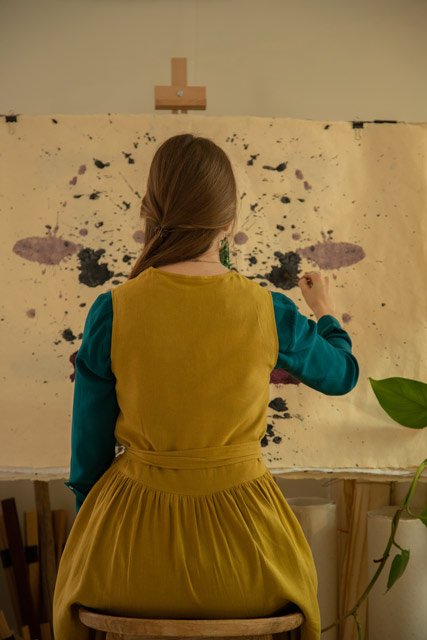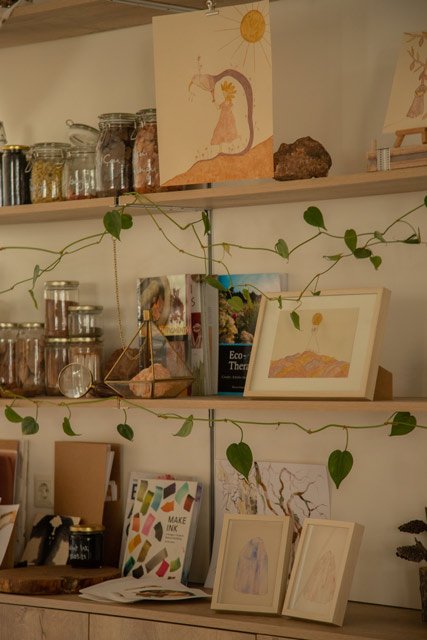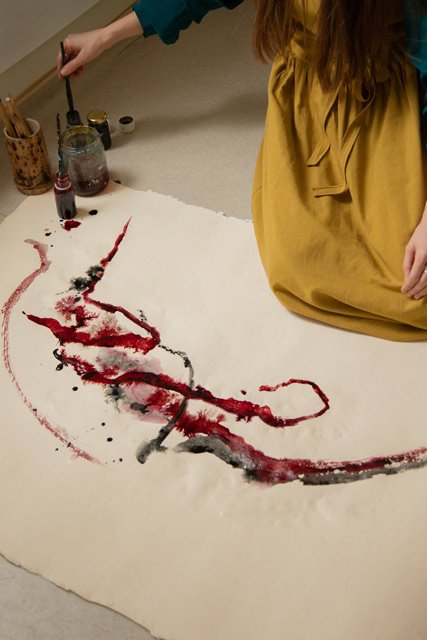Deniz wearing Simone Wrap Dress in olive oil.

stories no.15
Deniz Soykan
#workday
Deniz is a painting artist who paints naturally using botanical inks she obtains from plants, along with inspiration and healing from nature. We went to the place where she could express herself best in the studio called Deniz Kızı Sanat (Mermaid Art) in Ankara and visited her. We spent a day with her and asked a few questions that she would tell us about Deniz.

Deniz wearing Simone Wrap Dress in olive oil.
stories no.15
Deniz Soykan
#workday
Deniz is a painting artist who paints naturally using botanical inks she obtains from plants, along with inspiration and healing from nature. We went to the place where she could express herself best in the studio called Deniz Kızı Sanat (Mermaid Art) in Ankara and visited her. We spent a day with her and asked a few questions that she would tell us about Deniz.
Q1. Can we say that art is a self-expression for you? If so, what do you tell us about yourself through your works?
Deniz: I can say that besides opening up a space for me to express my essence, art brings me closer to myself at every step, leaving breadcrumbs on my way about what my essence is. I believe that for the expression to come from the essence, one must work on oneself. This work, in my opinion, is not about reinventing oneself or correcting disorders, but about being able to recognize what already exists, our states. It does not make much sense to try to explain myself to others without knowing what is going on inside me, without even listening to my voice. That’s why I don’t believe that painting or other artistic expressions develop just by doing it, by taking courses. Creative, original expression emerge as one carries out self-fulfilling work. Being in nature, feeling the rhythm of nature, observing, meditating, participating in healing works that nourish my essence encourage my creative nature and art helps me to articulate and make visible all these experiences by mediating them. I do not make my creations to describe something to someone, but mostly to remind myself of something. Sometimes I do it to experience the creative process and collect the gifts of the process. Rather than saying “I told you this here”, this is the meaning of this creation for me for now, and its meanings can change as I change. This perspective liberates my creation as well. In this way, I believe that each creation tells its own story from within the person who sees it. I love the structure of art that stretches and expands me, and the possibility that it can expand the person who watches, listens, and reads it gives me hope in these cramped situations.

Q2. You use a variety of materials and perhaps little uncommon ones. Why is it so important to express your art through these tools?
Deniz: My discovery of natural materials started two years ago when I attended the training of Satsuma Studio in Datça. As a child who grew up in the city, it was only four or five years ago that I remember my connection with nature. I remember that I always threw myself into the lap of nature, especially when I had a hard time during my university years. I would sit for hours with my back against a tree. At that time, I didn’t understand it very well and I thought that I was just spending time in an uninhabited place that I found empty. Now I realize that I was going to the most powerful healer, mother earth, to relieve my pain. As I realized this, as a city resident, I started to try harder to be in nature and to explore the tiny nature in the city. Participating in the natural dyeing training on top of this awareness opened different doors for my work. I started to pay attention to the fact that the materials I use are natural and my creations are less harmful to the ecosystem. The pleasure I get from being in nature and observing has increased with researching and collecting natural materials. The best thing for me about working with natural materials is the gifts that the preparation process brings; Being in nature, seeing it, noticing it, touching it, feeling it. All of these offer such an extensive experience that the painting I made with these materials is like a gift from the process. Another importance for me of using natural materials, which are very new in my life, is that I believe that the spirit and experiences of plants also participate in that picture. I think that’s the magic part of it. Therefore, I attach importance to collecting plants and the ecosystem properly. Even when I cannot gather it myself, I prefer to use the pigments of the brands that supply natural dyes. I cannot say that I am making completely non-toxic, ecological art, but as a person who has just started walking on this path, I attempt to progress by considering both nature and my creative process as much as I can.
Q3. What if we ask a slightly reversed and dystopic question; What would it be like not to be able to express yourself, your inner soul, feelings, thoughts, not to reflect Deniz?
Deniz: Unfortunately, this question is not far from today, it is quite a delusional process to find your unique way of expression in a structure where everything is monotonous. Not being able to express oneself is an experience that I have had from time to time and maybe we have in common. I went through periods when I thought I couldn’t reflect on myself. As a quiet, introverted, and sensitive child, I always had a hard time expressing myself in a world where those with louder voices were listened to and cared for. I believed/I was persuaded that this state of mine was inadequate, incomplete. Indeed, as I accept that this is not a problem, it is my way of being, I learned that I could express myself in my way, not by raising my voice or suppressing something. Painting, writing, and physical work mediated me on this path. As you asked, assuming that all these tools are absent and all forms of expression are restricted, I imagine a resentful girl locked in her room. The resentful child has the power to continue playing even if there is no one next to her, but we care and need to be seen and supported. As a resentful child, I don’t know if I would have found the strength to continue my own game would be easy to visualize but painful to experience.
Q1. Can we say that art is a self-expression for you? If so, what do you tell us about yourself through your works?
Deniz: I can say that besides opening up a space for me to express my essence, art brings me closer to myself at every step, leaving breadcrumbs on my way about what my essence is. I believe that for the expression to come from the essence, one must work on oneself. This work, in my opinion, is not about reinventing oneself or correcting disorders, but about being able to recognize what already exists, our states. It does not make much sense to try to explain myself to others without knowing what is going on inside me, without even listening to my voice. That’s why I don’t believe that painting or other artistic expressions develop just by doing it, by taking courses. Creative, original expression emerge as one carries out self-fulfilling work. Being in nature, feeling the rhythm of nature, observing, meditating, participating in healing works that nourish my essence encourage my creative nature and art helps me to articulate and make visible all these experiences by mediating them. I do not make my creations to describe something to someone, but mostly to remind myself of something. Sometimes I do it to experience the creative process and collect the gifts of the process. Rather than saying “I told you this here”, this is the meaning of this creation for me for now, and its meanings can change as I change. This perspective liberates my creation as well. In this way, I believe that each creation tells its own story from within the person who sees it. I love the structure of art that stretches and expands me, and the possibility that it can expand the person who watches, listens, and reads it gives me hope in these cramped situations.
Q2. You use a variety of materials and perhaps little uncommon ones. Why is it so important to express your art through these tools?
Deniz: My discovery of natural materials started two years ago when I attended the training of Satsuma Studio in Datça. As a child who grew up in the city, it was only four or five years ago that I remember my connection with nature. I remember that I always threw myself into the lap of nature, especially when I had a hard time during my university years. I would sit for hours with my back against a tree. At that time, I didn’t understand it very well and I thought that I was just spending time in an uninhabited place that I found empty. Now I realize that I was going to the most powerful healer, mother earth, to relieve my pain. As I realized this, as a city resident, I started to try harder to be in nature and to explore the tiny nature in the city. Participating in the natural dyeing training on top of this awareness opened different doors for my work. I started to pay attention to the fact that the materials I use are natural and my creations are less harmful to the ecosystem. The pleasure I get from being in nature and observing has increased with researching and collecting natural materials. The best thing for me about working with natural materials is the gifts that the preparation process brings; Being in nature, seeing it, noticing it, touching it, feeling it. All of these offer such an extensive experience that the painting I made with these materials is like a gift from the process. Another importance for me of using natural materials, which are very new in my life, is that I believe that the spirit and experiences of plants also participate in that picture. I think that’s the magic part of it. Therefore, I attach importance to collecting plants and the ecosystem properly. Even when I cannot gather it myself, I prefer to use the pigments of the brands that supply natural dyes. I cannot say that I am making completely non-toxic, ecological art, but as a person who has just started walking on this path, I attempt to progress by considering both nature and my creative process as much as I can.
Q3. What if we ask a slightly reversed and dystopic question; What would it be like not to be able to express yourself, your inner soul, feelings, thoughts, not to reflect Deniz?
Deniz: Unfortunately, this question is not far from today, it is quite a delusional process to find your unique way of expression in a structure where everything is monotonous. Not being able to express oneself is an experience that I have had from time to time and maybe we have in common. I went through periods when I thought I couldn’t reflect on myself. As a quiet, introverted, and sensitive child, I always had a hard time expressing myself in a world where those with louder voices were listened to and cared for. I believed/I was persuaded that this state of mine was inadequate, incomplete. Indeed, as I accept that this is not a problem, it is my way of being, I learned that I could express myself in my way, not by raising my voice or suppressing something. Painting, writing, and physical work mediated me on this path. As you asked, assuming that all these tools are absent and all forms of expression are restricted, I imagine a resentful girl locked in her room. The resentful child has the power to continue playing even if there is no one next to her, but we care and need to be seen and supported. As a resentful child, I don’t know if I would have found the strength to continue my own game would be easy to visualize but painful to experience.



